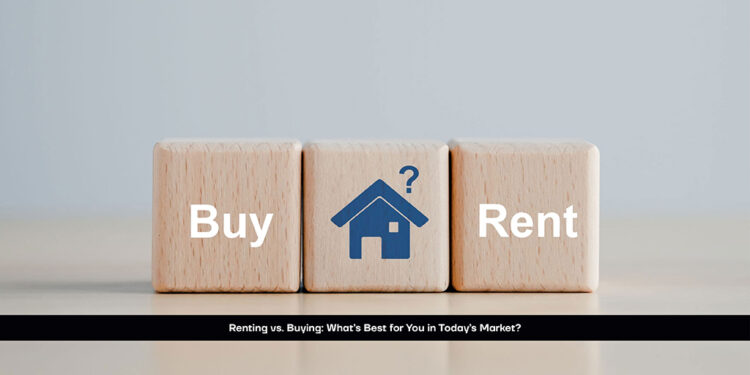Deciding between renting and buying a home can be a difficult choice, especially in today’s fluctuating real estate market. Renting offers flexibility and fewer responsibilities. Renters don’t have to worry about property maintenance or dealing with unexpected repairs, which can be a major benefit for those who prefer a hands-off living situation. Renters also have the freedom to move more easily, which is ideal for people with uncertain job situations or those who simply want to experience different neighborhoods or cities. Additionally, renters typically don’t have to deal with property taxes or the costs associated with homeownership, making it a financially easier option for many.
On the other hand, buying a home offers long-term stability and the potential for financial growth. When you own a home, you’re building equity over time, unlike renting, where your monthly payments go to a landlord without offering any return on investment. Homeownership also allows for greater freedom to personalize your space, from renovations to landscaping. While the upfront costs of buying a home—such as the down payment, closing costs, and inspections—can be steep, many homeowners see these as worthwhile investments in their financial future. Additionally, mortgage rates in certain markets can be more affordable than the cost of rent, which can make buying a home appealing.
One of the most important factors to consider when deciding between renting and buying is the local real estate market. In some areas, home prices are skyrocketing, making it difficult for many buyers to enter the market. In these markets, renting might make more sense, especially if home prices are expected to decline or stabilize in the near future. On the other hand, in areas where home prices are stable or increasing, buying a property may be a sound long-term investment, especially if you plan on staying in the area for an extended period. Researching current market trends is crucial to making an informed decision that suits your financial goals.
Financial considerations also play a significant role in the renting vs. buying debate. Renting typically requires less upfront financial commitment, with only a security deposit and monthly rent to pay. In contrast, buying a home often comes with substantial initial costs, such as a down payment, closing costs, and possibly renovations. However, as mentioned earlier, buying a home provides long-term financial benefits, such as equity growth, tax deductions, and the potential for property appreciation. The decision often comes down to whether you have the financial stability to handle the initial costs of buying a home or if it’s more practical to rent and save for a future purchase.
The length of time you plan to stay in your home is another key factor. If you’re planning to stay in a particular area for a short period, renting may be the better option due to its flexibility. Buying a home typically makes more sense if you’re planning to stay in one place for at least five to seven years. This is because the costs of buying and selling a home—such as closing fees, agent commissions, and moving expenses—can add up quickly. If you sell within a short period, you may not recoup those costs and could lose money on the transaction. A long-term commitment makes buying more financially viable.
While buying a home can be financially rewarding, it also comes with responsibilities that renters don’t face. Homeowners are responsible for maintenance, repairs, and property taxes, which can add to the overall cost of owning a home. Unexpected expenses like roof repairs or plumbing issues can be costly and inconvenient. Renters, on the other hand, are usually not responsible for such issues, and any needed repairs are handled by the landlord or property management company. This can be a significant advantage, particularly for those who don’t want the time, effort, or financial strain of home upkeep.
In conclusion, whether renting or buying is the best option depends on your individual circumstances. Renting offers flexibility and lower upfront costs, making it a good choice for those with uncertain job prospects or a preference for less responsibility. Buying, on the other hand, provides the opportunity to build equity and secure long-term financial stability, making it a better choice for those who plan to stay in one place for several years and are financially prepared for the initial costs. Carefully weighing your financial situation, future plans, and the local market will help you make the right decision for your needs.















 The Inc Media is one of the most renowned global Online Business Magazines, that carries news stories about entrepreneurship, small business management, and business. Being a global business magazine, we carve for influential stories and try to take them globally to uplift the business standards and educate the people about new innovations in the business world...
The Inc Media is one of the most renowned global Online Business Magazines, that carries news stories about entrepreneurship, small business management, and business. Being a global business magazine, we carve for influential stories and try to take them globally to uplift the business standards and educate the people about new innovations in the business world...